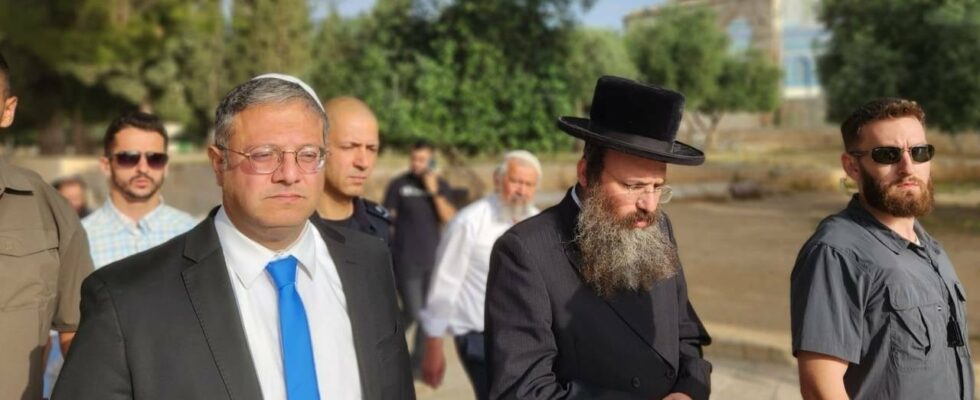Itamar Ben Gvir, Israeli Minister of National Security, sparked a new controversy on Monday over the esplanade of mosques in Jerusalem. An ultra-sensitive place, called the Temple Mount by Jews, al-Haram al-Sharif (“noble sanctuary”) by Muslims. It is the holiest site in Judaism and the third holiest site in Islam, after Mecca and Medina. The place is at the very heart of the Israeli-Palestinian conflict and the subject of recurring tensions that can sometimes degenerate into war, as was the case in spring 2021.
Under a historic status quo that the State of Israel committed to respecting in 1967, Muslims can go there at any time of the day or night, and Jews, like all non-Muslims, can access it at certain times, under strict surveillance, but are not allowed to pray there or enter in possession of religious symbols. However, in recent years, Jewish religious extremists have been claiming this right, increasingly flouting the established rules.
Challenging the status quo
On Monday, Itamar Ben Gvir, a far-right Israeli minister, sided with them, questioning the validity of the status quo on the Jerusalem Mosque esplanade. “If I could do anything I wanted, I would put an Israeli flag on the site,” he said Monday in an interview with Israeli military radio Galei Tsahal. Even if it meant building a synagogue there if he could? Pressed by the journalist several times to answer this question, Itamar Ben Gvir finally said: “Yes.” This minister is not new to this. Since entering the government in December 2022, he has visited this disputed holy site at least six times, visits denounced as provocations and attacks on the status quo by the Palestinians and many foreign capitals. “Arabs can pray wherever they want,” the minister said in his interview with Galei Tsahal, “so Jews should also be able to pray wherever they want.”
Although the site is administered by Jordan, access to it is controlled by Israeli security forces. As minister of national security, Itamar Ben Gvir is therefore responsible for enforcing the status quo, but he himself flouted it spectacularly on August 13 by going to the esplanade with several hundred Israelis for a prayer on the occasion of a Jewish holiday. Prime Minister Benjamin Netanyahu’s office then described the “incident” as a “breach of the status quo” and asserted that only “the government and the prime minister […] define the policy [israélienne] on the Temple Mount,” and not this or that minister.
“Irresponsible statements”
On Monday, his new statement forced, once again, the services of Prime Minister Benjamin Netanyahu to publish a laconic statement, assuring that there is “no change in the status quo on the Temple Mount”. More incisive, while Israel is at war in the Gaza Strip against the Palestinian Islamist movement Hamas since the bloody attack launched by the latter on October 7, Defense Minister Yoav Gallant judged on X that “Ben Gvir’s actions endanger the security of the State of Israel”. “Questioning the status quo on the Temple Mount is a dangerous, useless and irresponsible act”, he added. Interior Minister Moshe Arbel called on Prime Minister Netanyahu to “put Mr. Ben Gvir in his place”, reports The Times of Israel, calling his statements “irresponsible.”
Itamar Ben Gvir, openly far-right, became a minister in 2022 thanks to Benjamin Netanyahu, and is used to these controversial positions and actions. “This is the reason for Itamar Ben Gvir’s existence […] He is an opposition man who does not know how to deal with the political culture expected of a minister, of a member of the civil service,” he explained to franceinfo Denis Charbit, professor of political science at the Open University of Israel.
“The holy sites are the red line that we will not allow to be crossed,” said the spokesman for the presidency of the Palestinian Authority, Nabil Abu Rudeina. Hamas called Ben Gvir’s remarks “dangerous” and called on “Arab and Islamic nations to take their responsibilities to protect the holy sites.” While “Jordan will take all necessary measures to put an end to the attacks on the holy sites,” reacted its Ministry of Foreign Affairs, which “is preparing the necessary legal files to file an action before international courts” on this subject.
